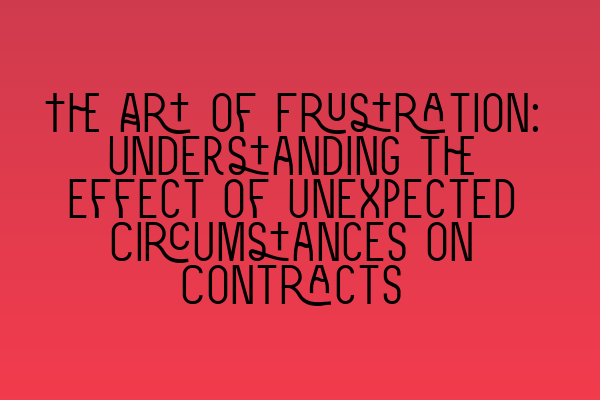The Art of Frustration: Understanding the Effect of Unexpected Circumstances on Contracts
Contracts are the lifeblood of business transactions, providing parties with a clear framework to govern their rights and obligations. However, despite the best intentions and efforts of the parties involved, unexpected circumstances can arise that disrupt the performance of a contract. These unforeseen events can lead to frustration, uncertainty, and potential disputes.
What is Frustration?
Frustration, in contract law, refers to a situation where an unforeseen event occurs after the formation of a contract, which renders it impossible or radically different from what was originally intended. When frustration occurs, it can release both parties from their contractual obligations and provide them with legal remedies.
Examples of Frustrating Events
There are various examples of frustrating events that can occur, such as:
- Natural disasters
- Government actions or legislation
- War or civil unrest
- Death or incapacity of a party
- Unforeseen changes in circumstances
These events, often beyond the control of the parties, can substantially impact the ability to perform the contract as originally intended.
Effects of Frustration
When frustration occurs, it has several potential effects on the contract:
Termination
Frustration may lead to the automatic termination of the contract, relieving both parties of their obligations. However, it is essential to determine if the frustrating event genuinely makes it impossible to perform the contract or merely more difficult or burdensome.
Recovery of Money
If the contract is frustrated, the parties may be entitled to recover money paid, performance already rendered, or expenses incurred before the frustrating event occurred. However, the exact amount recoverable will depend on the circumstances and the specific terms of the contract.
Limitations on Recovery
It is crucial to note that the law surrounding frustration can be complex, and recovery is not always guaranteed. Courts closely scrutinize the parties’ actions and the nature of the frustrating event to determine if relief is appropriate. Additionally, some contracts may contain clauses that address the consequences of frustrating events, providing additional guidance or limitations.
How to Manage Frustration in Contracts
While frustration may be a challenging circumstance to navigate, there are steps that parties can take to manage its potential impact:
Thorough Contract Drafting
When drafting a contract, it is essential to anticipate and address potential frustrating events. Including specific clauses that outline the parties’ rights and obligations in such situations can help minimize uncertainty and potential disputes. By being proactive in the drafting stage, parties can ensure that their interests are protected in the event of frustration.
Reviewing and Updating Contracts
Contracts should be periodically reviewed and updated to reflect changing circumstances or new potential risks. By staying proactive and addressing potential areas of frustration, parties can minimize future conflicts and better protect their interests.
Seeking Legal Advice
If a frustrating event occurs, it is crucial to seek legal advice as soon as possible. A solicitor with expertise in contract law can assess the situation, help determine if frustration applies, and guide parties through the legal process, ensuring that their rights are protected.
Conclusion
Understanding the effect of unexpected circumstances on contracts is crucial for businesses and individuals alike. Frustration can have significant implications, ranging from contract termination to recovery of money. By being proactive in contract drafting, regularly reviewing contracts, and seeking legal advice when necessary, parties can better navigate the challenges that may arise as a result of frustration.
For more information on legal topics related to contracts and the legal profession, please refer to the following articles:
- Mentorship for Aspiring Solicitors: Nurturing Talent in the Legal Field
- Legal Challenges and Pitfalls: Navigating the Complexities of the Legal System
- The GDL (Graduate Diploma in Law): A Pathway to Becoming a Solicitor
- Mastering the Solicitor’s Path: Prepare for the Journey Ahead
- The Benefits of Becoming a Solicitor: A Rewarding Career
